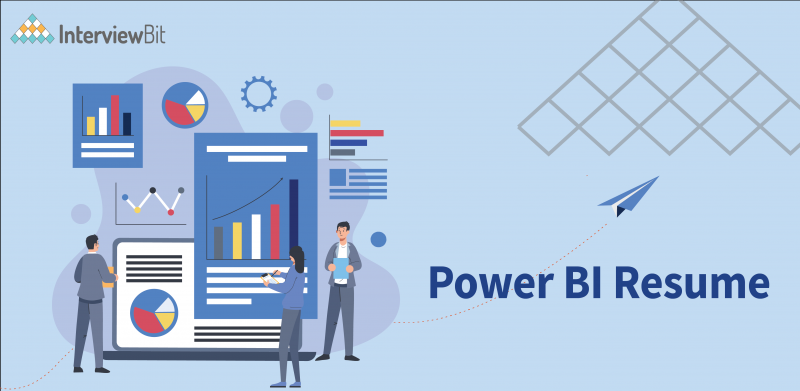Introduction
Data is crucial to digital innovation, which is currently being used by nearly all businesses and regions. Nowadays, data skills are in high demand. With so much data being generated every day, it’s become critical to analyze and use data in order to make judgments. This shows that the role of business intelligence specialists has a brighter future and more opportunities.
To translate raw data into meaningful information or visualization in the form of easy-to-understand reports and dashboards that may help businesses make choices, a business intelligence tool is necessary. This tool has a direct impact on the strategic, tactical, and operational business decisions made by an organization. Microsoft’s Power BI is one of the top business intelligence solutions available. It allows end-users to produce reports and dashboards using self-service analytics. Power BI is a widely used business intelligence application, with users ranging from students to startups, SMEs, and huge corporations.
What is Power BI?
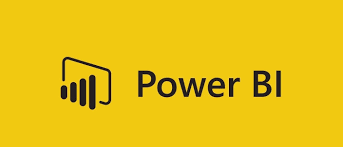
Microsoft’s Power BI is a set of Business Intelligence and Analytics Services. It has interactive visualization and powerful analytics features, allowing anybody to make more informed and timely decisions.
Confused about your next job?
Due to its ease of use and interactive visualization, Power BI is at the top of the list of popular BI products. On-premises or in the cloud, Power BI provides a scalable and consistent platform for gathering, refining, analyzing, and presenting data. Through interactive dashboards and data-rich, easy-to-understand reporting, it provides enterprises with a 360-degree view. It’s part of the Microsoft Business Intelligence (MSBI) package, and it has a lot of services, products, and apps.
Career Opportunities with Power BI
As previously stated, business intelligence has improved firms’ decision-making skills, allowing them to make the best future choices for their businesses and ultimately expand more. Power BI has risen to the top of all BI tools in terms of business analytics. Most MNCs and larger organizations now have a high need for Power BI-certified professionals.
With each passing day, business processes get more complex, prompting companies to seek out technology that can help them display data in real-time and derive actionable data insights. Power BI is one of the most prominent business intelligence tools that has provided sectors with a long-awaited solution and altered the way enterprises are run.
In practically every area, such as software, retail, and healthcare, there is a great demand for Power BI expertise. Those who are still undecided about whether this is a promising career path or not should surely pursue it.
Future Supply and Demand Power BI’s Purpose
Power BI has become a popular tool of the business world due to its exceptional cloud-based data visualization capabilities, and its popularity is unlikely to wane in the near future. Furthermore, it is a Microsoft product, which has already released a number of market-leading products. Because Power BI is a cloud-based product, it has a lot of potential in the future as businesses migrate to cloud platforms and away from on-premise work environments.
As a result, we can conclude that Power BI has a bright future, and anyone interested in pursuing a career in this industry can do so with confidence. Jobs in Power BI pay well and allow you the opportunity to work for prestigious firms. Power BI professions, particularly Power BI developers, Power BI consultants, and Power BI analysts, are in high demand due to the tool’s vast range of career options.
Let’s go over everything that makes this Power BI Developer resume stand out:
Power BI Developer Resume
The job of a Power BI developer is to turn raw data into actionable insights using bespoke dashboards and data visualizations. As a result, your Power BI analyst resume should include accurate information about your experience with business intelligence, databases, and BI technologies.
The first person who looks at your resume when you apply for a Power BI developer position at a company is, well, not a human. Businesses utilize an Applicant Tracking System (ATS) to sift out the vast majority of job candidates using keyword matching and automatic resume processing.
Because everyone is distinctive, resumes should be as well. Before you start writing a Microsoft Power BI resume, keep the following points in mind:
- Make your CV as long as you need it to be. It’s fine to have a résumé that’s more than one page long. It’s not a smart idea to ignore important parts of your career.
- The material in the Power BI developer resume should be organised in bullet points, making it easy to read and provide only relevant work abilities to keep recruiters’ attention while also saving their time.
- To make your Power BI developer CV look professional, use the proper font size and style. Use 11-12 points for ordinary text and 14-16 pts for section titles when it comes to font size. Arial, Verdana, Calibri or Times New Roman are examples of professional fonts.
- Use a professional email address that includes your name and is simple to recall.
- Only include projects, certificates, and work experience that are relevant to the job description. Emphasise the importance and scope of your position in the experience section of your CV. As much as possible, quantify your accomplishments. Focus on your qualities and how you can benefit the company if you lack appropriate work experience or credentials.
- Lines should be spaced 1-1.15 inches apart, and margins should be 1 inch wide.
- Make sure your resume is free of spelling and grammatical errors by proofreading it.
- For your experiences, use reverse-chronology order.
- Unless you’re specifically informed otherwise, save it as a PDF. PDFs preserve the structure of your document and may be read on almost any device.
A Power BI Developer resume should have the following elements from top to bottom:
- Contact information
- Resume summary
- Education
- Work experience
- Skills
- Projects
- Additional sections( Language proficiency, Publications, Affiliations and Membership, Volunteering, Interest and hobbies)
Contact Information
This section does not call for any innovation, but it does call for factual accuracy. This is crucial; the last thing you want is a curious recruiter who wants to interview you but can’t get in touch with you! As a result, you should always double-check this section before submitting your resumes. The first component of your Power BI developer resume is the contact information section. The following are examples of this:
- Name and surname
- Professional title and accreditation (if you have one)
- Updated phone number ( Do check your number several times before submitting)
- Location (City and State/Country)
You can also mention your LinkedIn page here if you have one. Include a phone number that you use frequently so that you don’t miss any recruiter calls. In some circumstances, recruiters may aim to interview candidates over the phone, so be prepared. Recruiters can contact you via email in addition to your phone number, which is an easy and quick option.
You must state your professional status to distinguish yourself as a candidate who is qualified for the desired job description. The following information is sent to recruiters via your profile title on your resume for the role of Power BI Developer :
- Your current title at work.
- Your level of seniority in your line of business.
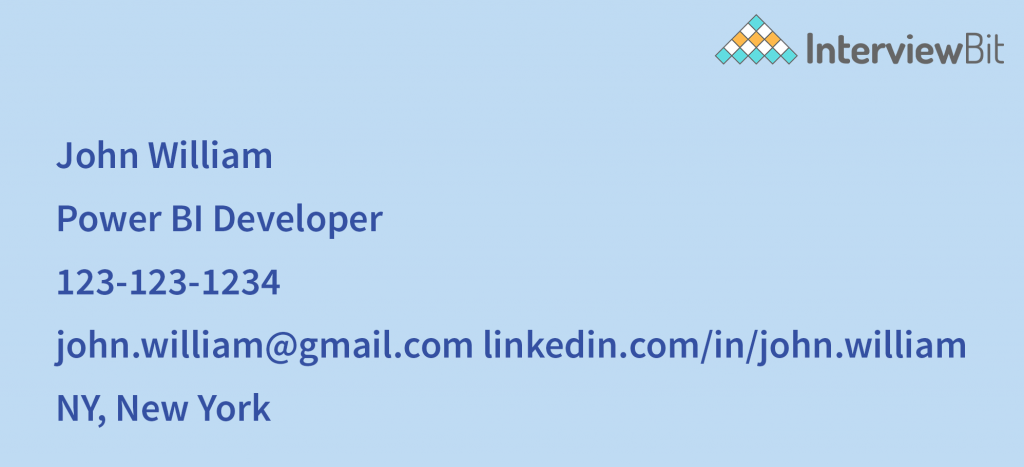
Resume Summary
For the Power BI developer role, a resume summary is a one- to the three-sentence description that outlines your most important education and experiences. Summaries are vital since they allow you to swiftly and concisely emphasize the primary technical skills required for the position you want. It’s also crucial to personalize your resume summary for each position you apply for, as each employer may have different experience requirements or skill sets.
Active language can help you keep your sentences short and transmit information to employers more rapidly when writing a resume summary. It’s also a good idea to include the organization and position you’re looking for by name in the summary’s final paragraph. Including the name of the company or organization can demonstrate that you’ve adapted your resume to their industry and are enthusiastic about the position they’re providing.

Education
Unless you have a lot of experience, it is always a good idea to include some information about your educational qualification. For your bachelor’s degree, as well as your master’s degree, you should provide the name of your university (if any). If you think the number is particularly tempting, you can add your CGPA. If you have taken a course from a reputable institution, it will boost the weight of your CV. It’s also a good idea to add any academic achievements or accolades that are related to a Power BI CV position in the bullet-point form beneath the name of the school or institution.

Work Experience
If you’re an experienced professional looking for a new position, this is where you should focus your efforts. This part contains all of your relevant work experience for this position. Recruiters will prioritize this part while sorting resumes. You will not be considered if you have insufficient or irrelevant work experience. You may have a lot of relevant work experience, but you also need to know how to present it to the recruiter in the best way possible.
Write your prior job title, then the firm name, and the length of time you worked for them. You should immediately highlight the role you played for the company underneath this. Also, make a point of mentioning any earnings or positive adjustments you’ve achieved for the company.
You’ll need excellent SQL development abilities, as well as an understanding of coding in some of the most common languages, like C#, Java, Python, and others, if you’re a Power BI Developer. You must also possess exceptional analytical and communication abilities. Try to keep them as quantifiable as feasible.
You will be unable to add any work experience to your CV as a fresher, so it is critical that you work on a variety of projects and complete internships in related sectors. Also, provide your professional aspirations so that recruiters may get a sense of your long-term objectives.
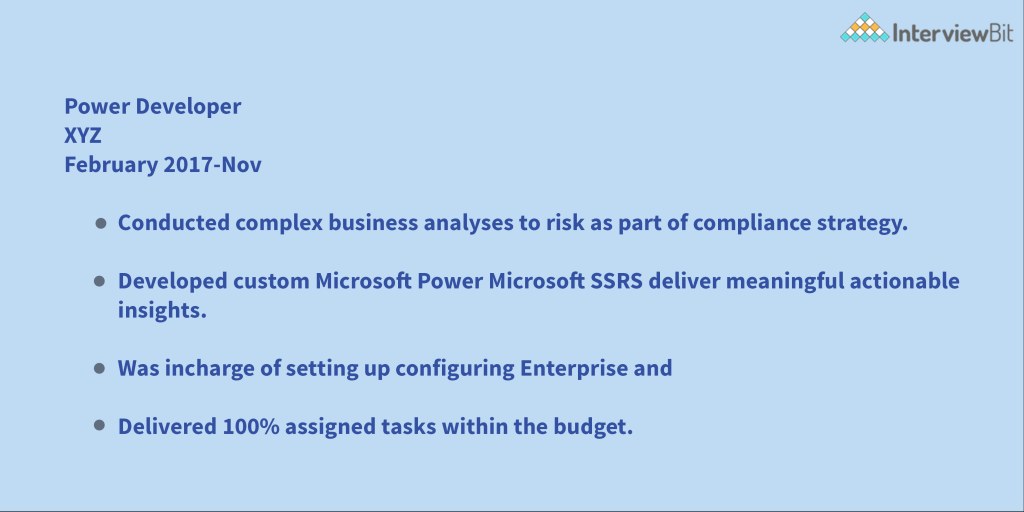
Skills
This resume section comes in second, immediately after your experience in terms of importance. Recruiters rely on this area to quickly determine who has it. Only include skills that are actually required. Create a dashboard with a mix of soft and technical skills. On a typical day, you’ll collaborate with team members, supervisors, and clients to use high-tech tools to creatively optimize business operations. As a result, the more diverse your skills section is, the better!
To quickly provide information to the company and decrease the length of the resume, utilize a bullet-point list and brief phrases when highlighting your skills. An employer can rapidly comprehend what you can provide to the open Power BI role or position if they can interpret your occupational talents properly. It’s crucial to add any major technical abilities or knowledge that can effectively demonstrate your expertise for the Power BI position when you’re listing your skills. If particular technical talents, such as data analysis expressions (DAX), have a common shorthand, adopting the abbreviations can help you simplify your resume without losing the employer’s attention. It might also help you demonstrate your knowledge and professionalism in the field.
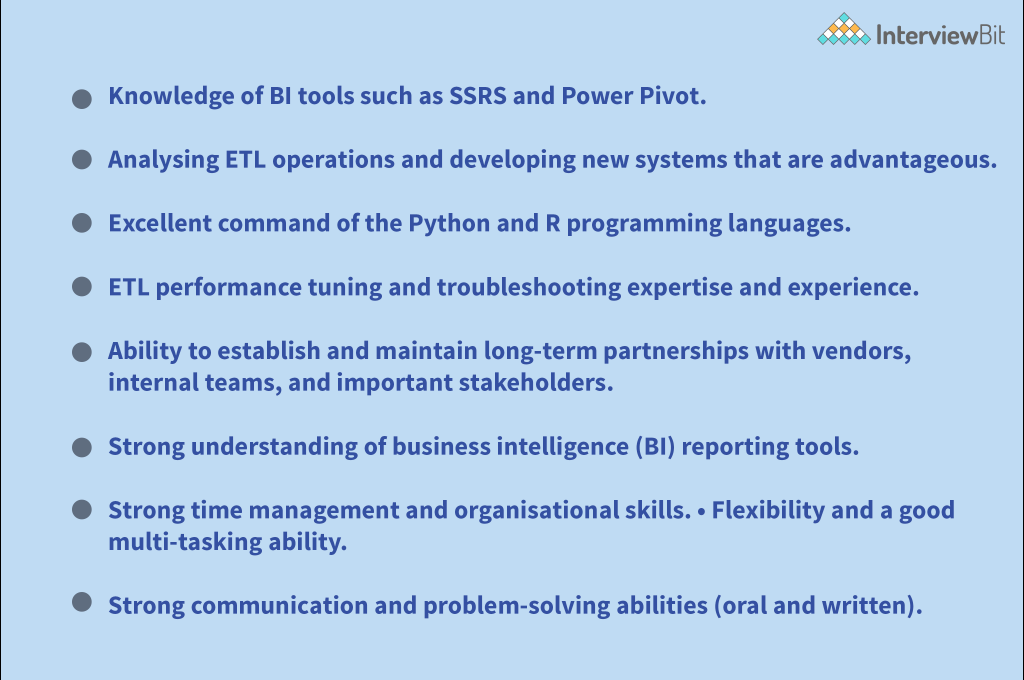
Projects
The second most crucial section of a CV project. In this part, you must detail all of the relevant projects you have completed up to this point. Even if you have little professional experience, really cool and exceptional ideas draw a lot of attention. Having good projects on your resume shows you’ve been able to successfully solve a variety of real-world challenges while also employing the many Power BI tactics you’ve mastered.
You need some cool projects, especially when developing a Power BI resume, that show you’ve used visualization technologies like PowerBI and database tools like MySQL, MongoDB, and so on.
Additional Sections
Making you stand out from the rest of the candidates with similar credentials. Consider whether recruiters are conflicted between you and another candidate with comparable work experience and skills. Having a list of your relevant qualifications or publications on hand could be really helpful in making their decision.
Adding a bit of variation to your Power BI resume. Companies are searching for developers that will not only be skilled but also fit into their company culture. These extras can show the recruiter what you’re enthusiastic about and how you’re not only a good fit in terms of skills, but also a good fit in terms of culture.
Here are some additional areas to consider for your Power BI Developer resume:
Language proficiency
If there is enough space, provide a language section. If you’re joining an international company, it’s a good idea to indicate the languages you’re fluent in, as well as your level of proficiency in each. Sort the languages into groups based on how well they can communicate:
- Native
- Fluent
- Proficient
Volunteering
If you don’t have much professional experience, you can highlight your volunteer experience. Volunteering demonstrates your commitment, ideals, and morals. Any job applicant who includes a section on their CV for volunteer work experience will almost certainly receive extra credit.
Memberships & Affiliations
Include professional organizations in which you are a member to demonstrate your commitment to computer science, information technology, and software engineering in particular.
Publications
Publications include scientific studies in technology journals and business magazines or periodicals.
Hobbies and interests
Include a hobbies section on your resume if your resume permits it as an easy way to demonstrate your individuality. Before you mention your hobbies and interests on your CV, think about what you’re trying to communicate to potential employers. Mentioning your hobbies can help employers understand how you spend your time and what other abilities you have.
Interests, on the other hand, may reflect topics on which you are currently conducting a study or would like to conduct research, indicating a good fit for the organization.

Conclusion
Power BI is one of the most widely used business intelligence tools across a wide range of industries, resulting in significant demand for Power BI expertise. We’ve covered the main guidelines and tactics to keep in mind when writing a CV for a Power BI job profile in this article. Tips for writing a CV for a Power BI developer.
Here are some more pointers to help you write a powerful CV for a Power BI developer:
ATS-friendly
An ATS (Applicant Tracking System) is a piece of software that evaluates your resume’s eligibility based on the presence or absence of keywords. Great resumes must be ATS-friendly; otherwise, the ATS will reject them. We recommend giving your CV a comprehensive examination if you want ATS to approve it.
Employing such keywords in your resume can assist companies in quickly recognizing your professional qualifications and emphasizing your resume as a viable candidate in any application sorting program. If a job posting asks for someone with Python programming experience, for example, it might be beneficial to mention your Python programming knowledge in your talent area.
Mention your soft skills
Though a Power BI developer’s job often necessitates a wide range of technical talents, it’s also crucial to describe any soft skills you’ve developed and how they relate to the open position. Highlighting any teamwork skills you have, for example, can show employers that you can work effectively with others, whilst mentioning your critical-thinking skills can show companies that you can tackle a variety of problems or obstacles. Consider your soft skills and how they helped you in previous Power BI employment as you outline your applicable abilities and work experience.
Make use of numbers
Using statistics to highlight your primary strengths and capabilities will help you swiftly demonstrate your talents and experience. Consider utilizing a sentence like “Used my data analysis and reporting talents to boost company efficiency by 25%” when stating your responsibilities from a previous Power BI developer role. When an employer sees how you’ve helped other businesses in the past, they’ll have a better idea of how you can help their business grow and prosper in the future.
Relevance
A resume could be appropriate for one job but not for another. The reason for this is that a strong resume highlights the most significant characteristics that a candidate possesses that will enable them to excel in that specific job – not every job offered. As a result, if you want your CV to impress recruiters, customize it for each application.
FAQ’s
Q. What is the role of Power BI Developer?
Ans. The following are the major roles of a Power BI developer:
- Using Power BI desktop, create visual reports, dashboards, and KPI scorecards.
- Excellent analytical thinking skills for converting data into visually appealing reports and graphs.
- Build row-level security on data and understand the application security layer models.
- Knowledge of how to use advanced level calculations on a data collection.
- Ability to create tabular and multidimensional models that are warehouse-compatible.
- Capable of fully comprehending company requirements and developing data models in accordance while managing resources.
- Proficient in running DAX queries and expertise in the application of advanced level calculations to a data collection.
- Understand business requirements in the context of business intelligence (BI) and create data models to transform raw data into useful information.
Q. How would you describe Power BI skills?
Ans. Power BI has interactive visualization and powerful analytics features, allowing anybody to make more informed and timely decisions. A Power BI developer should first and foremost be knowledgeable with data science, business intelligence, and data analytics. He or she should be familiar with the ideas of data integration, data warehousing, modeling, business intelligence, and presentation. Importing data, manipulating data, managing relationships, working with Data Analysis Expressions (DAX), and creating visualizations and reports are just a few of the skills you’ll learn.
Q. What skills are required for Power BI?
Ans. Power BI Developers must have the following skills:
- Knowledge of Data visualisation, Data modelling and mathematical measures.
- Experience with BI tools and systems like Power BI, SAP, Tableau, and others, as well as creating data-rich dashboards, implementing Row-level Security (RLS) in Power BI, writing DAX expressions, and developing custom BI products using scripting and programming languages like R, Python, and others.
- Work experience in data-related roles: A minimum of two or three years of experience working with BI tools or in any data-related function, with a thorough understanding of database management, data modelling, business intelligence, SQL querying, data warehousing, and online analytical processing (OLAP.)
- Knowledge of the Microsoft Business Intelligence Stack, which includes Power BI, SSAS, SSRS, and SSIS.
- Knowledge of Data analytics, that is, the capacity to dive down into data and depict it using charts, reports, and dashboards in the most effective way possible.
- Understanding of both the architectural and technical aspects of software development.
- The most crucial ability for retrieving data from SQL servers is Structured Query Language (SQL).
- Building interactive dashboards is the most important skill to master in order to be hired for a Power BI employment.







 Join WhatsApp Group
Join WhatsApp Group
